
Hillary Clinton (D-NY) during a rally on June 2 in Sioux Falls, South Dakota
On Tuesday night in Montana, the last Democratic primary in the nation ends, one hour after the polls close in South Dakota. The fourth-largest state in terms of area (but with fewer than one million people and only three electoral votes) was long accustomed to being flown over by presidential candidates. But this year, both Hillary Clinton and Barack Obama are working hard to pick up a majority of the 17 delegates apportioned by primary voters, plus eventual endorsements from eight independent superdelegates.
The candidates have been frequent visitors to Big Sky Country. Both showed up on April 5 for the state Democrats' annual Mansfield-Metcalf Dinner at the Civic Center in Butte (where the last major event was December's spectacular funeral ceremony for native son Evel Knievel). Obama has been running prime-time TV ads in Montana markets for the past month, the latest using footage of his Montana appearances. Clinton's cash-strained campaign, meanwhile, waited until just a few days before the vote to place her spots. But she has also been represented in the state by surrogates like husband Bill Clinton, who hadn't been back since 1995, as well as daughter Chelsea.
Both candidates have taken on the main issues that concern Montanans: high gas prices and gun rights. In the state, driving 100 miles daily to hold down a blue-collar job is not unusual, and gas prices have hit especially hard. Senator Clinton said Congress needed to investigate speculation in the oil markets, promising to "rein in" the excesses of the major oil companies. Obama, for his part, promised to "spend $150 billion over 10 years investing in clean and renewable energy." He also said he plans a $1,000 tax break to help middle-income families pay gasoline and utility bills.
On gun control, too, the candidates are sounding like Montanans. Obama told a Great Falls audience last Friday, "I believe in the rights of hunters and sportsmen." Word came to the state on Saturday via a press conference call that Clinton has softened her hard line against handguns, retracting her earlier support for tight national restrictions (though she still favors registration and licensing of pistols in New York State).
If turnout at rallies is any measure, Obama has been outdoing Clinton, often by a margin of three to one. The contrast was evident in early April in Missoula, where 8,500 people cheered an Obama rally at the University of Montana. The next day, Clinton outlined her case to 1,500 people at a fund raiser in an airport hangar. Obama drew 7,000 on May 19 at Montana State University in Bozeman. As in other places, many of his fans are young, noisy and eager to help.
Clinton polls well statewide among older white women, and among a majority of Democrats in the conservative eastern half of the state, while Obama rated highest in the traditionally liberal, organized-labor towns of the western half. But a poll taken the third week of May showed Obama handily winning Montana Democrats. While only three of the state superdelegates have publicly pledged for Obama, the rest are likely to go the way of the primary results.
At a small, populist-flavored "Obama Rama" rally in a Billings city park in a low-income neighborhood Saturday, Obama superdelegate John Melcher, 84, a former U.S. Senator said, "I think this is the best campaign I've ever seen, except for John Kennedy's." He told the gathering he backs Obama because the Iraq war has drained assets better used elsewhere, and said he sees Obama as "a sound, qualified leader," who "has the capacity to draw good people to him, and to retain them."
But does that mean the state will go for Obama in November? Despite the excitement among younger Montanans, polls give Montana to McCain in the general election — and the state hasn't gone Democratic in a presidential race since 1992.
Perhaps with November in mind, both campaigns have focused attention on the state's seven Indian reservations, a crucial bloc that helped narrowly defeat incumbent GOP Sen. Conrad Burns in 2006. Both expressed support for improved federal-tribal relations and medical care. Clinton visited the Flathead Reservation, and daughter Chelsea met Thursday with a group of state tribal leaders. Obama was adopted into the Crow Tribe by the Black Eagle family just before he spoke to 3,000 supporters at the reservation's Veterans Park a few miles from the site of Custer's Last Stand. He's hoping that Montana will be his opponent's last stand as well.
